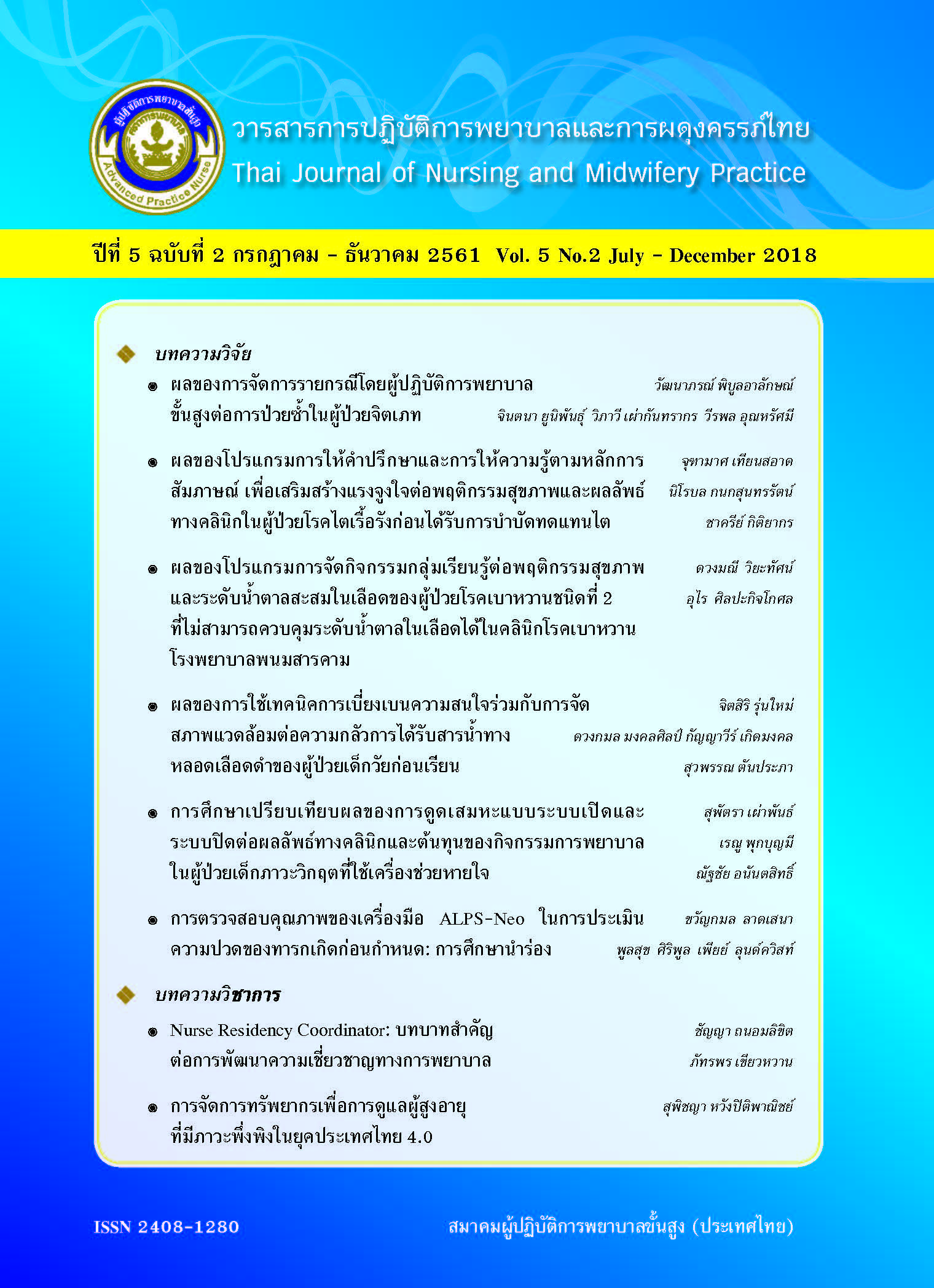The Effect of Case Management by Advanced Practice Nurse on Relapse in Persons with Schizophrenia
Main Article Content
Abstract
This quasi-experimental research with the posttest control groups design aimed to evaluate the effectiveness of case management on relapse in persons with schizophrenia. The subjects were 67 in-patients with relapse schizophrenia of a psychiatric institute. Thirty five subjects were randomized to an experimental group and thirty two subjects to a control group. The experimental group received case management by an advanced practice nurse (APN), while the control group received the usual nursing care for inpatients with a discharge plan. Research instruments were a case management process with 7 steps lasted for 4 weeks. The relapse was measured by The Brief Psychiatric Rating Scale (BPRS) (conceptual disorganization, hallucinatory behavior and unusual thought content). Data were analyzed using Fisher’s exact test. Results: The findings revealed that there was no relapse in the experimental group at 4 weeks after discharge, whereas there were 4 relapse cases in the control group (Fisher’s Exact = 4.65, df = 1, p-value = .04). Results suggested that case management by Advance Practice Nurse (APN) could be an effective model to prevent relapse among schizophrenic patients.
Downloads
Article Details
References
2. Ayuso-Gutiérrez J, del Río Vega J. Factors influencing relapse in the long-term course of schizophrenia. Schizophrenia research. 1997;28(2-3):199-206.
3. Robinson D, Woerner M, Alvir J, Bilder R, Goldman R, Geisler S, et al. Predictors of relapse following response from a first episode of schizophrenia or schizoaffective disorder. Archives of general psychiatry. 1999;53(6):241-7.
4. Sendt KV, Tracy DK, Bhattacharyya S. A systematic review of factors influencing adherence to antipsychotic medication in schizophrenia-spectrum disorders. Psychiatry research. 2015;225(1-2):14-30.
5. Kavanagh D. Recent development in expressed emotion and schizophrenia. British journal of psychiatry. 1992;160:601-20.
6. Smith L, Newton R. Systematic review of case management. Australian and New zealand journal of psychiatry. 2007;41(1):2-9.
7. Malakouti SK, Nojomi M, Panaghi L, Chimeh N, Mottaghipour Y, Joghatai MT, et al. Case-management for patients with schizophrenia in Iran: a comparative study of the clinical outcomes of mental health workers and consumers' family members as case managers. Community mental health journal. 2009;45(6):447-52.
8. Dieterich M, Irving CB, Park B, Marshall M. Intensive case management for severe mental illness. The Cochrane database of systematic reviews. 2010(10):CD007906.
9. Mas-Exposito L, Amador-Campos JA, Gomez-Benito J, Mauri-Mas L, Lalucat-Jo L. Clinical case management for patients with schizophrenia with high care needs. Community mental health journal. 2015;51(2):165-70.
10. Hemarat K, Siengchokyoo P, Khunarak U, Panasuna N. Effects of case management in schizophrenic patients on medication compliance and relapse. The journal of psychiatric nursing and mental health. 2012;26(2):62-73.
11. Sreewisan J, Chaichumni N. Effects of case management on lenth of stay , health care cost service satis faction of patients and relative and relaped rate of schizophrenic patients. The journal of psychiatric nursing and mental health. 2005;19(1):48-59.
12. Ziguras JS, Stuart WG. A meta-analysis of the effectiveness of mental health case management over 20 years. Psychiatric services 2000;51(11):1410-21.
13. Herrick CA, Bartlett R. Psychiatric nursing case management: past, present and future. Issues in Mental Health Nursing. 2004;25:589–602.
14. Powell S, Tahan H. Case management: a practice guide for education and practice: Lippincott Williams & Wilkins.; 2010.
15. Peplau HE. Interpersonal relations in nursing: A conceptual framework of reference for psychodynamic nursing. New York: Springer Publishing Co, Inc; 1991.
16. Brown NW. Psychoeducational groups: process and practice. 2nd ed. New York: Brunner-Routledge; 2004.
17. Anderson CM, Reiss DJ, Hogarty GE. Schizophrenia and the family a practitioner's guide to psychoeducation and management. New York: A division of guilford publications; 1986.
18. Shadish WR, Cook TD, Campbell DT. Experimental and quasi-experimental designs for generalized causal inference 2nd edition. Boston: Houghton Mifflin; 2002.
19. Polit DF, Hungler BP. Nursing research. Principles and methods. sixth ed. New York: Lippincott Company; 1999.
20. Meijel BV, Kruitwagen C, Gaag MVD, Kahn RS, Grypdonck MHF. An intervention study to prevent relapse in patients with schizophrenia. Journal of nursing scholarship. 2006;38(1):42-9.
21. Cochran WG. Sampling Techniques, Third Edition. New York: John Wiley & Sons; 1977.
22. Overall J, Gorham D. The Brief Psychiatric Rating Scale (BPRS): Recent developments in ascertainment and scaling. Psychopharmacology Bulletin. 1988;24:97-9.
23. Gleeson JF, Rawlings D, Jackson HJ, McGorry PD. Early warning signs of relapse following a first episode of psychosis. Schizophrenia research. 2005;80(1):107-11.
24. Thompson K, Kulkarni J, Sergejew AA. Reliability and validity of a new Medication Adherence Rating Scale (MARS) for the psychoses. Schizophrenia research. 2000;42:241–7
25. Jannah S, Suttharangsee W, Nukaew O. The effect of Islamic-Based Insight Enhancement Program (IBIEP) on medication adherence of persons with schizophrenia: A pilot study. Songklanagarind journal of nursing. 2016;36(2):15-29.
26. Sukthon K, Uthis P, Kertchok R. Effects of family group psychoeducation on burden and high expressed emotion in caregivers of schizophrenic patients in community. The journal of psychiatric nursing and mental health. 2012;26(3):15-27.
27. Laird E, Holcomb P. Elective Case Management: Key Elements and Practice from the Field Issue Brief. 2011 [12 October 2017]. 1-13]. Available from: https://www.mathematica-mpr.com/-/media/publications/pdfs/labor/case_management_brief.pdf.
28. Glettler E, Leen MG. The advanced practice nurse as case manager. Journal of case management 1996;5(3):121-6.
29. Farrelly S, Brown G, Szmukler G, Rose D, Birchwood M, Marshall M, et al. Can the therapeutic relationship predict 18 month outcomes for individuals with psychosis? Psychiatry research. 2014;220(1-2):585-91.
30. Xia J, Merinder LB, Belgamwar MR. Psychoeducation for schizophrenia. The Cochrane database of systematic reviews. 2011(6):CD002831.
31. Psychoeducation for schizophrenia [Internet]. Cochrane Database Syst Rev. 2002 [cited 28th Feb 2016]. Available from: https://www.ncbi.nlm.nih.gov/pubmed/12076455.
32. McFarlane WR. Family Interventions for Schizophrenia and the Psychoses: A Review. Family process. 2016;55(3):460-82.
33. Bromley E. A collaborative approach to targeted treatment development for schizophrenia: a qualitative evaluation of the NIMH-MATRICS project. Schizophrenia Bulletin . 2005;31(4):954-61.
34. Steinacher B, Mausolff L, Gusy B. The effects of a clinical care pathway for schizophrenia: a before and after study in 114 patients. Deutsches Arzteblatt international. 2012;109(46):788-94.


